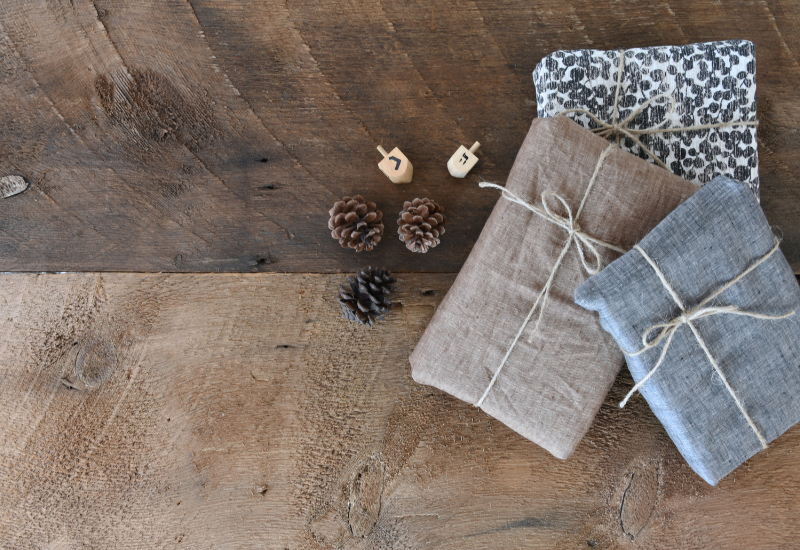At this time of year, it’s important to remember that the holidays can be challenging, or even difficult and that it is perfectly normal to have a complicated relationship with the season. While there is great joy that often comes with holidays, there can also be stress, depression, trauma, and guilt.
We’re reminded of an annual report by the American Psychiatric Association in 2021 that found that stress and anxiety levels increase dramatically during the holidays. The study found that we worried about
- Finding the right gifts
- Finding too many gifts
- Affording gifts
- Traveling
- Staying home
- Missing relatives
- Seeing relatives
- Eating too much
- Not eating enough
- Drinking too much
And more. If we look at the patterns, it’s easy to see that a lot of the challenges are related to binaries surrounding family, money, time, and food.
It can be easy to be hard on ourselves for so many reasons this time of year. Even feeling less than festive can be a cause of guilt and anxiety—after all, isn’t this season supposed to be magical? It can be equally easy to put unnecessary pressure on those around us to “find the holiday spirit” or even to be the source of holiday joy for us. And the end result of all of that pressure is just more stress.
Because these are things that affect us all, we wanted to share a few thoughts:
On family:
Families can be wonderful. They can be a vital and supportive part of our lives. For those in treatment or recovery, they can be our cheerleaders and caregivers. But that dynamic isn’t always present, and it isn’t always possible. Sometimes we have complicated relationships with family members. Other times they are absent from our lives for any number of reasons. It is a good idea to be careful and sensitive with the idea of family with those with whom we interact.
On the weather:
As we approach the Winter Solstice, the shorter days and longer nights can be difficult for those who struggle with mood. Some experience the “winter blues,” while for others, and particularly those with bipolar disorder, Seasonal Affective Disorder may cause substantial disruption. Honor that, and recognize it as a possible reason for struggle.
On money:
This time of year tends to bring a focus onto consumerism, particularly related to shopping and gift-giving. This can bring financial stress for some, and trigger compulsive spending in others. Let’s be aware of these parts of the season, and work to support ourselves and those around us if challenges arise.
On food:
There are often conflicting messages about food this time of year. First, there’s a spirit of abundance and celebration. But then, and especially with the new year, there are often messages of guilt and restriction, and promises of resolutions of a “new you” for the New Year. Let’s not lose sight of the joys we can take in food, and in the power of mindful, intuitive, and practical eating. Let’s be cautious of the ideas we share, and be ready to support those who may struggle.
How can we make the season (more) bright?
With all of this in mind, here are a few tips for how we all (client and provider alike) can navigate the holiday season without shutting down—ways we can take pleasure in the magic this season has to offer.
- Plan ahead. Work with a trusted friend, loved one, your therapist, or RD to come up with a list of coping strategies in advance related to the areas where you struggle most, whether it’s family, food, or something else.
- Determine what you most like about this time of year and make an effort to prioritize it. Perhaps you love catching up on rest and taking time off from work or school. Maybe you cherish spending time with loved ones. You may delight in decorating your home with lights and other items that make your environment cozy and warm. Or you might adore watching all your favorite Hallmark movies. Make the holidays your own by highlighting your favorite things and working through the rest.
- Practice saying no and don’t commit to more than you feel able to handle. This is a GREAT time of year to set some boundaries and stick to them. Attend the parties you want to attend and skip the rest. Visit with the folks who bring you joy, without feeling obligated to oblige toxicity. If crowds aren’t your thing, find a new boutique for your shopping.
Whatever your relationship to the holidays, you have the power to change the narrative about what the season means to you. And for those who are able, your kindness and generosity of spirit may equally shape those around you.
At Galen Hope, we strive to always be a community of integrated wellness, defined by our belief that, together, we can Belong, Heal, and Grow.
THE ROAD TO WELLNESS STARTS BY SEEKING HELP. TODAY.
Built on the principles of assertive community treatment, Galen Hope is an eating disorder and mental health treatment center offering individualized treatment options that include Intensive Outpatient (IOP), supported housing, and Partial Hospitalization Programs (PHP). As a “Community of Integrated Wellness,” we pride ourselves in fostering a thoughtful and meaningful care experience that can guide our clients on their road to recovery and increased quality of life, regardless of diagnosis. Galen Hope currently offers separate, age-specific programming for female and transfeminine adolescents ages 12-17 and adults 18 and up, as well as gender-specific programming for males and transmasculine individuals with eating disorders and primary mental health diagnoses.
To learn more, or to join our community for integrated wellness, please contact us today.
Belong. Heal. Grow.

